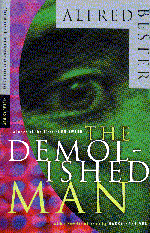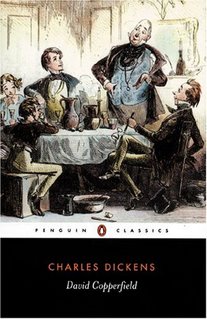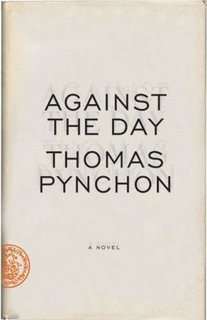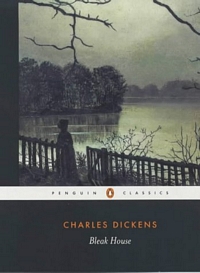Wayward Readings & 2006 in Review:
As 2006 comes to a close, I realize that there are several books I read over the year that I never got around to commenting on. Whether I read them for my classes , for my book group, or for fun, here are a few others that occupied my time this year:
Michael Faber, The Crimson Petal and the White -- Follows the trials and tribulations of Sugar, a 19th Century prostitute in England ... sort of a contemporary Moll Flanders, in a way. Not terribly "literary," but it's good "fluff" reading.
Edmond Rostand, Cyrano de Bergerac -- I read this for book group. Fun stuff, and the movie's just as good. Wonderful wordplay throughout the work, akin to a French Oscar Wilde.
Carlos Fuentes, The Death of Artemio Cruz -- Introduced this in A.P. English in the spring; it went over like a lead balloon, but I liked it. A classic of magic realism.
David Yaffe, Fascinating Rhythm: Reading Jazz in American Writing -- Great series of essays that detail the influence of jazz on post-WWII writers like Mailer, Salinger, Ellison, et al.
Ann Radcliffe, The Mysteries of Udolpho -- Worst piece of gothic drivel I read all year (not that I read a lot of gothic drivel this year, mind you). I read it for book group in preparation for our January discussion of Jane Austen's Northanger Abbey. 'Supposed to have been very popular in its day. A real clinker, in my opinion.
Charles Dickens, The Christmas Stories (A Christmas Carol, The Chimes, The Cricket on the Hearth, The Haunted Man, and The Battle for Life) -- Read these and taught the first three for my fall Newberry seminar. Carol is by far the best!
Gary Paulsen, Soldier's Heart -- Began the year in my Dimensions in Reading class with this novel of a young man's coming of age as a foot soldier in the Civil War. My students enjoyed it!
Colin Higgins, Harold and Maude -- Technically, this is a re-read for me. But it's been years since I taught this book, and I used it in my Dimensions in Reading class. Brilliant dark humor with a liberal dose of Zen koans and irony make this book a winner for any reader!
In retrospect, I guess I've read about thirty-three separate books this year, not counting the various and sundry readings I've had to do in addition to those (e.g., literary criticisms, secondary sources, and biographical accounts for the Dickens novels, re-reading the books I normally teach in class, and the fact that many of the Dickens works I read this year I read twice -- once for content and basic plot, and once later for analysis each week with my students). Plus, that dern'd Pynchon novel was arguably the longest novel I've ever read: 1,085 pages! A-and my wife's Us! magazine keeps appearing in the bathroom each week, riveting me to the latest happenings in the lives of Paris, Britney, and Brangelina, so . . .
Ne'ertheless, already for 2007 I have some awesome old-school science fiction waiting to be read, as well as some much-needed non-fiction regarding Miles Davis, Samuel Johnson, and the Afterlife!
Who could want more?
Saturday, December 30, 2006
Friday, December 29, 2006

Alfred Bester, The Demolished Man
Taking a much-needed break from novels that exceed three-hundred pages and require thought, on Christmas morning I returned to one of my guilty pleasures: science fiction.
This Hugo Award-winning novel takes place in 24th-Century New York City, where mind-reading Espers ("peepers") mix with "normals" and help to regulate law enforcement. Consequently, crime has become virtually non-existent. Enter Ben Reich, one of the wealthiest New Yorkers and one who is willing to do anything -- even commit the first premeditated murder in eighty years -- to acquire the wealth of his business rival, D'Courtney. Enlisting the help of a couple of peeper acquaintances, Reich gets his hands on an ancient weapon -- a gun -- and locates D'Courtney in the midst of an elaborate parlor game at one of Maria Beaumont's elegant parties, only to find himself subsequently pursued by Esper cop Lincoln Powell in the party's aftermath.
Part detective novel, part Dostoyevskean meditation on crime and guilt, part Law and Order, and lots of paranoia a la Philip K. Dick with a Freudian undercurrent, The Demolished Man is a fun and fast-paced book that'll satisfy your old school sci-fi jonesin'.
Saturday, December 23, 2006

Charles Dickens, David Copperfield
Over the years, my experiences with this novel -- the quintessential Dickensian bildungsroman -- have been as varied as the life experiences of the title character himself.
Let's begin in 1987, when I was assigned to read the book in the late Professor Tom Deegan's British Literature seminar during my BA years at Saint Xavier University. Being the cocky twenty-one year old English major I was back then, I didn't bother to read it -- much like I didn't read Henry Fielding's Joseph Andrews in the previous semester's class taught by Professor Norm Boyer. In retrospect, I don't regret those decisions: I remember our class discussion of the Fielding novel lasting all of 15 minutes; I recall no discussion of the Dickens novel at all. So I didn't waste time reading a book that never got discussed at length anyways.
That copy of David Copperfield remained unread on my book shelf for years.
Fast forward to about ten years ago when, on a lark, I decided to read it ... and was hooked! It was by far the best book I'd read in years, and I still recall reading it in our old den -- the room that would eventually become my son's bedroom. My impressions of the book at that time were positive: it told a great story with passion and humor, yet also provided enough social commentary to remind you that you were reading a serious work of fiction. It was the perfect balance between the "fun" of early Dickens and the social critic of later Dickens.
And now I re-read it for my upcoming Newberry class, and yet another set of reactions.
As much as possible, I try to read the work in question during the preceeding term, assuming I'll then re-read it piecemeal with my students each week, thus bringing as close a reading of the text as I can in a short time span -- two full readings within several months. When I began Copperfield in the fall, it was pretty much what I remembered, but I wasn't exactly "enjoying" it. It lacked the "fun" I remembered from my reading a decade ago. So, having gotten about a third of the way through it, I set it aside and went directly to Bleak House -- a haunting and complex work. I toiled away for a month on it, and upon finishing I immediately started Thomas Pynchon's Against The Day -- a wacky and complex work. Upon finishing that book, I then resumed Copperfield.
Amazingly, now David Copperfield went down like a smooth glass of water. On the heels of two lengthy and difficult novels, David Copperfield read easily ... almost too easily ... and I'm most immediately struck by how our experiences with one text impact our experience with the next.
Regardless, David Copperfield remains a wonderful book! Enjoy it!
Happy holidays, by the way. I'm looking forward to acquiring lots of new books this holiday season!! May you do the same.
Thursday, December 14, 2006

Thomas Pynchon, Against The Day
I started this book on Tuesday, November 21st (the day it was released) and just finished it today. Whew!
Years ago I received a copy of Gravity's Rainbow as a Christmas gift, and I've been hooked on Pynchon's works ever since! By turns profound and hilarious, goofy and infuriating, beautifully eloquent and downright nauseating, his novels depict a world rooted in historical facts that are judiciously seasoned with hippie-era paranoia, jazz-inflected song lyrics, fetishisms, talking animals, quirky dialogue, and more pop culture references than a Chuck Klosterman essay. And despite publishing only six novels over a forty year writing career, the elusive Grandfather of Postmodernism has given us what may potentially be his final novel -- and it's a whopper!
Against the Day has an elaborate, rambling plot that goes something like this: Webb Traverse is a Colorado miner who moonlights as the Kieselguhr Kid, a dynamiting anarchist. When robber-baron capitalist Scarsdale Vibe puts a hit out on Webb, the Traverse kids -- sons Reef, Frank, Kit, and daughter Lake -- set out on their own narrative trajectories in part to avenge Webb's death. Along the way, each of Webb's kids gets involved in separate adventures that weave in and out of each other's lives as well as history itself, including the 1893 Columbian Exposition in Chicago, the Tunguska Event of 1908 in Siberia, the Mexican Revolution, World War I, and the early years of the motion picture industry in Hollywood, among others. We also get Skip the ball lightning, Thorvold the tornado, a young Groucho Marx, a Viennese operetta entitled The Burgher King, the walking dead, Chinese things, tarot cards, and lots of mayonnaise ... and peering down upon the action at all times are the wonderful Chums of Chance, a quintet of ballooning aeronauts who drift throughout the narrative with their lovable Henry James-reading skydog, Pugnax.
What I found most fulfilling here is the way in which Pynchon manages to link this novel with his previous five novels, tying together underground postal systems with the beginnings of modern weaponry with speculation about civilizations below the earth's surface with simple father-daughter and parent-child relationships, never once losing typical Pynchon themes and motifs like corporate greed, political conspiracy, labor issues, and harmonica marching bands (trust me on this). Had I not read his earlier novels, this work might seem like a rambling mass of 1,085 pages of jibberish; having read the other books, this is an elaborate "singl[ing] up all lines" of the massive ongoing novel that is "the works of Thomas Pynchon."
Which is not to suggest, however, that only veterans of Pynchon's works will enjoy Against The Day. Au contraire, this novel is much more accessible than his ever-daunting 1973 masterpiece, yet more enjoyably complex than, say, The Crying of Lot 49 or Vineland. If ever a reader wanted to experience the wacky world of Pynchon and follow the story to boot, s/he might reasonably opt for Lot 49 or Vineland before attempting the Rainbow -- or, dare I suggest it, cut his teeth on Against The Day.
Let the reader decide. Let the reader beware. ; )
Tuesday, December 05, 2006

Charles Dickens, Bleak House
This was actually a re-read for me, since I read it a few years ago for the Biblioholics Anonymous. Nevertheless, it is one of the next novels in my chronological reading of Dickens's canon: I spent about five weeks reading it, and finished it on the evening before Against The Day was released.
When you read Bleak House, you realize that you're in the presence of a masterpiece. It comes to you from the darkest corners of the novel, where even the minor characters wield significance; it comes to you from the two separative narrative points of view, at first a bit jarring but, eventually, quite necessary; it comes to you from the setting, which transports you from the mud and fog of London's streets to the sterile arrogance of Chesney Wold to the pox-ridden delapidations of Tom-All-Alone's; it comes to you from the mysteries heaped upon mysteries -- the Chancery suit of Jarndyce and Jarndyce that grinds on ad infinitum, the deaths of a solitary military man and a prominant lawyer, the spontaneous combustion of a rag-and-bones shop owner, the parentage of an innocent young girl, and the sufferings of My Lady Dedlock. Throughout, mysteries are steeped in curiosities wrapped in enigmas.
The fun of Bleak House comes, in part, from watching those mysteries unfold (it is said that this is the first "detective novel," and paved the way for Wilkie Collins's The Moonstone and the fiction of Sir Arthur Conan Doyle). There is humor, but rather than the rambling, shambling slapstick of Pickwick, here you get the voice of Dickens the social satirist (via such unforgettable characters as Mrs. Jellyby and Mr. Turveytop, among others). And it is pure pleasure to watch Dickens navigate our reading through a myriad of settings and characters and plotlines, fulfilling our expectations here and subverting them there, all the while in a prose that is well-paced and beautifully rendered.
This was even better the second time around! It's long, but well worth it!
Sunday, December 03, 2006

Ben Mikaelsen, Touching Spirit Bear
Cole Matthews is a fifteen-year-old juvenile delinquent who, in an attempt to avoid jail time for savagely beating a classmate, agrees to spend one year living alone on a remote island in southwest Alaska to complete a Native American healing process called "Circle Justice." At first, Cole is defiant. He attempts to escape, and in an ultimate act of poor judgment charges a white "spirit bear," which promptly mauls him and leaves him for dead.
So begins this outstanding novel by Ben Mikaelsen.
Like so many YA novels, this is a story about an adolescent's "growing up" and becoming a better person by novel's end. What makes this work truly enjoyable, however, is the author's forays into Native American spirituality as he details the difficulty with which Cole must overcome his demons to achieve inner peace. Also, Cole's experiences are drawn from the author's own troubled youth and exposure to Circle Justice, so there is a voice of authenticity behind the writing that makes Cole's characterization all the more poignant.
By turns a gripping adventure and a compelling meditation on Life's tranquil beauty, Touching Spirit Bear is a great read! I highly recommend it.
* * * * * *
These last two months have been insane. Although I've done a ton of reading and have lots to post here, I haven't had the time or energy to do so lately. I will do what I can this week to catch you up on the things I've been reading.
The biggest literary news, of course, is the release of Thomas Pynchon's 1,085-page tome Against The Day on November 21st. I'm trying to read about thirty pages a day in order to finish it by Christmas. As of today, I'm up to page 428. It's an incredible book. As I read the novel, I hope to contribute to the PynchonWiki as well as Pynchon-L's group reading of the novel starting in January, 2007. More to follow.
Subscribe to:
Comments (Atom)